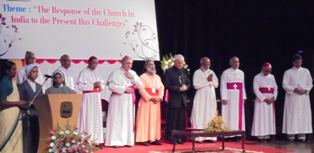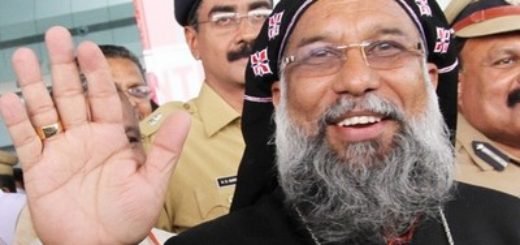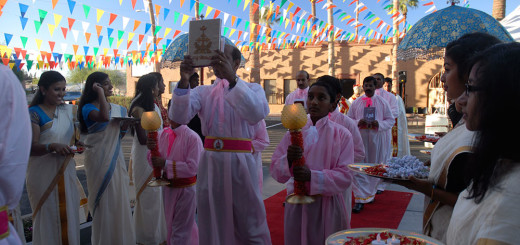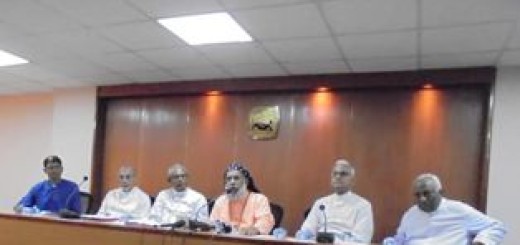Dialogue only way forward, bishops told

Published on: 11:29 pm, March 3, 2016 Story By: Philip Mathew -Published in – Matters India
Bangalore: The need for “dialogue” was stressed on the second day of the biennial plenary of the Catholic Bishops’ Conference of India (CBCI).
Speakers were unanimous in saying that dialogue was essential in solving problems affecting society and the community in the country. “The crying need of the hour,” they added, was to continue dialoguing, despite various challenges.
The plenary began on March 2 at St. John’s National Academy of Health Sciences, Bangalore, southern India. The main theme of the assembly is “The response of the Church in India to the present day challenges.”
Meenal, professor of Philosophy at the Bombay University, who presented the Hindu perspective of the theme, commended the two invaluable Christian principles of unconditional love and total service to humanity.
She explained the Vedic principles of Vasundhara Kudumbam (World in a family) and Truth being one, though expressed in various forms.
Inam Das, a Muslim entrepreneur from Pune, noted that the Constitution of India provides special rights to minorities and all minorities should claim those rights. He emphasized the greater need for staying together peacefully with the people of various religious backgrounds.
Fr. Mohan Das, a Catholic priest and professor, wanted dialogue as the new way of being a Church. It is the need of the day, he said.
Multiplicity of religious traditions is a bountiful gift of God, added the Divine Word priest who sought internal dialogue in the church for effective inter religious dialogue.
Sr. Shalini Mulackal, professor of theology at Vidyajyoti College, New Delhi, spoke on the challenges to the Church in India in its efforts to uplift the poor and the downtrodden.
Guiherne Vaz, an educationist from Mumbai, analyzed the present economic and educational challenges that the church in India is facing.
He observed that the monopoly of the Church in the field of education is no more a reality, and so the Church should thoroughly rethink its involvement in the field of education.
More than 180 bishops and other Church leaders attending the plenary heard the activity reports of the various commissions of the CBCI.
The CBCI was founded at the Metropolitans’ Conference held in Chennai (then Madras) in 1944.
The secretariat operated out of Bangalore until 1962, and since then New Delhi has been its base.
Isaac Gomes (Kolkata) wrote: It is heartening to note that the need for “dialogue” was stressed on the second day of the biennial plenary of the Catholic Bishops’ Conference of India (CBCI). The speakers' unanimous view that dialogue was “the crying need of the hour,” for solving various problems affecting society and the country is a very timely realization.
Let us hope it is not a pious resolution meant for photo ops and reporting purposes. For the Indian Church has continuously adopted a singular stance of "no dialogue by sweeping all pressing matters under the carpet". Forget dialogue, the church authorities do not even bother to acknowledge emails or letters sent to them. Petitions by the local laity are simply trampled and crushed under the foot. Many bishops and parish priests, even today live in the bliss of "I am the monarch of all I survey" and consider their territory as their fiefdom, whereas as per the Canon Law they are to act as "Caretakers" of the temporal goods which are to be "administered" for the welfare of the respective parishioners. One must remember donors give charities or donations not to line the pockets of Bishops or Parish Priests but for the welfare of concerned parishioners. Knowing this most bishops have not bothered about the institution of Parish Pastoral Councils (PPCs) and Parish Finance Committees (PFCs) in most parishes, in spite of the Vatican having mandated it more than fifty years ago.
So one understands why there are no real dialogues between the clery and the laity. For dialogues call for transparency & accountability. They call for large-heartedness and an openness to listen to others, especially dissenting views. True dialogues are held on equal footing, with mutual respect for each "stakeholder". Our Pope and his predecessor have urged the clergy (pastors) for the umpteenth time, to "smell the sheep" 24×7 and "take care of them". So the Bishops and other speakers should remember that dialogues are much more than that – it is "taking care of the flock (believers)".
And it is an on-going process for constant reciprocal healing of both the Laity and the Clergy.
Isaac Gomes (Kolkata)

















Isaac Gomes (Kolkata) wrote: It is heartening to note that the need for “dialogue” was stressed on the second day of the biennial plenary of the Catholic Bishops’ Conference of India (CBCI). The speakers' unanimous view that dialogue was “the crying need of the hour,” for solving various problems affecting society and the country is a very timely realization.
Let us hope it is not a pious resolution meant for photo ops and reporting purposes. For the Indian Church has continuously adopted a singular stance of "no dialogue by sweeping all pressing matters under the carpet". Forget dialogue, the church authorities do not even bother to acknowledge emails or letters sent to them. Petitions by the local laity are simply trampled and crushed under the foot. Many bishops and parish priests, even today live in the bliss of "I am the monarch of all I survey" and consider their territory as their fiefdom, whereas as per the Canon Law they are to act as "Caretakers" of the temporal goods which are to be "administered" for the welfare of the respective parishioners. One must remember donors give charities or donations not to line the pockets of Bishops or Parish Priests but for the welfare of concerned parishioners. Knowing this most bishops have not bothered about the institution of Parish Pastoral Councils (PPCs) and Parish Finance Committees (PFCs) in most parishes, in spite of the Vatican having mandated it more than fifty years ago.
So one understands why there are no real dialogues between the clery and the laity. For dialogues call for transparency & accountability. They call for large-heartedness and an openness to listen to others, especially dissenting views. True dialogues are held on equal footing, with mutual respect for each "stakeholder". Our Pope and his predecessor have urged the clergy (pastors) for the umpteenth time, to "smell the sheep" 24×7 and "take care of them". So the Bishops and other speakers should remember that dialogues are much more than that – it is "taking care of the flock (believers)".
And it is an on-going process for constant reciprocal healing of both the Laity and the Clergy.
Isaac Gomes (Kolkata)